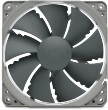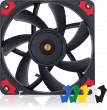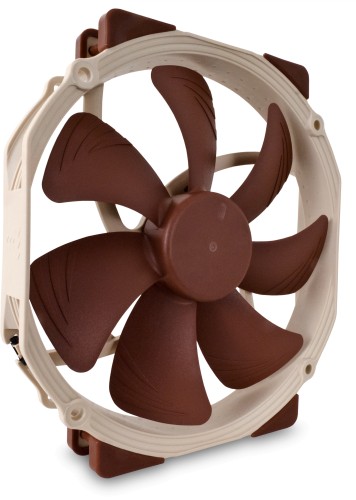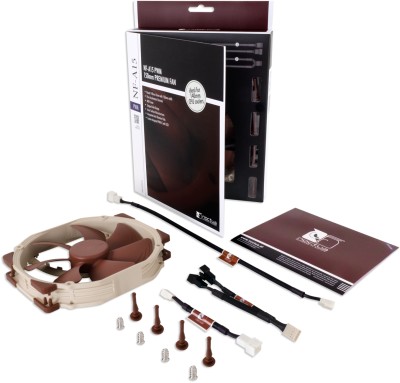NF-A15 PWM 12V 1200RPM 140mm Round Frame Premium Fan € 24.84 6 in stock | ||
| More variations available Show | ||
Noctua NF-A15 PWM 12V 1200RPM 140mm Round Frame Premium Fan
The fully featured NF-A15 PWM features 120mm mounting holes and has been enlarged to 150mm width in order to provide superior performance on today’s high-end CPU coolers.
Features
- Ultra Low Noise edition
- Noctua’s AAO (Advanced Acoustic Optimisation)
- Integrated Anti-Vibration Pads
- Flow Acceleration Channels
- Improved SS02 bearings
- Six year warranty
The NF-A15 is a premium quality quiet 140mm fan with a round frame that complies with Noctua’s AAO (Advanced Acoustic Optimisation) standard. The NF-A15s frame features 120mm mounting holes (105mm spacing) and has been enlarged to 150mm width in order to provide superior performance on today’s high-end CPU coolers. Featuring sophisticated aerodynamic design measures such as Flow Acceleration Channels, the NF-A15 further improves the renowned quiet cooling performance of the award-winning NF-P14. Noctua’s custom designed PWM IC for fully automatic speed control and reference class SSO2 bearings guarantee superb running smoothness and excellent long-term stability. Topped off with modular cabling, a Low-Noise Adaptor and 6 years manufacturers warranty, the NF-A15 is a premium choice for the highest demands.
A successor to the award-winning NF-P14
Noctua’s NF-P14 fan has become a default-choice among PC enthusiasts looking for a premium quality quiet 140mm fan. Thanks to its efficient aerodynamic optimisations, the NF-A15/14 provides higher static pressure and an even better airflow/noise ratio than its much acclaimed predecessor.
Round 140mm frame with 150mm width
The NF-A15 is tailor-made for use on today’s high-end CPU coolers: While its 150mm width matches those of most high-end heatsinks, its 140mm height doesn’t make it extend on top and thus ensures best case compatibility. The NF-A15s standard 120mm mounting holes (105mm spacing) also make it an ideal performance upgrade for 120mm case or CPU fans.
Flow Acceleration Channels
The NF-A15 impeller features suction side Flow Acceleration Channels. By speeding up the airflow at the crucial outer blade regions, this measure reduces suction side flow separation and thus leads to better efficiency and lower vortex noise.
AAO Frame
Noctua’s AAO (Advanced Acoustic Optimisation) frames feature integrated anti-vibration pads as well as Noctua’s proprietary Stepped Inlet Design and Inner Surface Microstructures, both of which further refine the fans performance/noise efficiency. button
Stepped Inlet Design
Noctua’s Stepped Inlet Design adds turbulence to the influx in order to facilitate the transition from laminar flow to turbulent flow, which reduces tonal intake noise, improves flow attachment and increases suction capacity, especially in space restricted environments.
Inner Surface Microstructures
With the tips of the fan blades ploughing through the boundary layer created by the Inner Surface Microstructures, flow separation from the suction side of the blades is significantly suppressed, which results in reduced blade-passing noise and improved airflow and pressure efficiency.
Integrated Anti-Vibration Pads
Integrated Anti-Vibration Pads made from extra-soft silicone minimise the transmission of minute vibrations while maintaining full compatibility with all standard screws and other mounting systems.
SSO2 Bearing
The NF-A15 features the further optimised second generation of Noctua’s renowned, time-tested SSO bearing. With SSO2, the rear magnet is placed closer to the axis to provide even better stabilisation, precision and durability.
Metal bearing shell
In order to guarantee the highest possible degree of manufacturing precision, minimum tolerance and excellent long-term stability, the NF-A15 sports a CNC milled bearing shell made entirely from brass.
Custom designed PWM IC with SCD
Supporting fully automatic PWM speed control, the NF-A15 PWM uses Noctua’s novel, custom designed NE-FD1 PWM IC that integrates Smooth Commutation Drive (SCD) technology. By providing smoother torque impulses, SCD suppresses PWM switching noises and thus makes the fan quieter at low speeds.
Low-Noise Adaptor
The NF-A15 PWM is supplied with a Low-Noise Adaptor (L.N.A.) that reduces the maximum fan speed from 1200 to 900rpm. The L.N.A can be used either to run the fan at a fixed speed of 900rpm or to cap the maximum speed when using automatic PWM control.
Extensive cabling options
The fans short 20cm primary cable minimises cable clutter in typical applications while the supplied 30cm extension provides extended reach when necessary. Both cables are fully sleeved and the supplied 3 to 4 pin adaptor allows to connect the fan directly to the power supply.
Ultra-Low Power Consumption
Despite of its further improved performance, the NF-A15 PWM consumes only 0.96W of power, which amounts to a reduction of about 20% as compared to its predecessor. This doesn’t only make it eco-friendly but also helps to cut down the electricity bill!
6 years manufacturer’s warranty
Noctua fans are renowned for their impeccable quality and outstanding longevity. Like all Noctua fans, the NF-A15 features an MTBF of more than 150,000 hours rating and comes with a full 6 years manufacturers warranty.
| Specifications | NF-A15 PWM |
|---|---|
| Size | 140x150x25 mm |
| Connector | 4-pin PWM |
| Bearing | SSO2 |
| Blade Geometry | A-Series with Flow Acceleration Channels |
| Frame Technology | AAO (Advanced Acoustic Optimisation) |
| Rotational Speed (+/- 10%) | 1200 RPM |
| Rotational Speed with L.N.A. (+/- 10%) | 900 RPM |
| Min. Rotational Speed (PWM) | 300 RPM |
| Airflow | 67.9 CFM |
| Airflow with L.N.A. | 52.2 CFM |
| Acoustical Noise | 19.2 dB(A) |
| Acoustical Noise with L.N.A. | 13.8 dB(A) |
| Static Pressure | 1.51 mm H2O |
| Static Pressure with L.N.A. | 0.89 mm H2O |
| Max. Input Power | 0.96 W |
| Max. Input Current | 0.08 A |
| Voltage | 12 V |
| MTBF | 150.000 h |
| Contents | Low-Noise Adaptor (L.N.A.), 4-Pin Y-Cable, 30cm Extension Cable, 4 Vibration-Compensators, 4 Fan Screws |
| Warranty | 72 months |
| EAN barcode | 4716123314806 |
| Specifications | NF-A15 PWM |
|---|---|
| Size | 140x150x25 mm |
| Connector | 4-pin PWM |
| Bearing | SSO2 |
| Blade Geometry | A-Series with Flow Acceleration Channels |
| Frame Technology | AAO (Advanced Acoustic Optimisation) |
| Rotational Speed (+/- 10%) | 1200 RPM |
| Rotational Speed with L.N.A. (+/- 10%) | 900 RPM |
| Min. Rotational Speed (PWM) | 300 RPM |
| Airflow | 67.9 CFM |
| Airflow with L.N.A. | 52.2 CFM |
| Acoustical Noise | 19.2 dB(A) |
| Acoustical Noise with L.N.A. | 13.8 dB(A) |
| Static Pressure | 1.51 mm H2O |
| Static Pressure with L.N.A. | 0.89 mm H2O |
| Max. Input Power | 0.96 W |
| Max. Input Current | 0.08 A |
| Voltage | 12 V |
| MTBF | 150.000 h |
| Contents | Low-Noise Adaptor (L.N.A.), 4-Pin Y-Cable, 30cm Extension Cable, 4 Vibration-Compensators, 4 Fan Screws |
| Warranty | 72 months |
| EAN barcode | 4716123314806 |
Product Resources
FAQ
How do I measure fan size?
The size of fan you need will generally be determined by the size of the fan fitting position in your PC case. The sizes of all the fans on our website are shown as measured along any one of the fan’s four sides, NOT the distance between the fan’s screw holes! Our most popular fan size is 120mm, followed by 80mm. This isn’t really dictated by customer preference, but more by recent designs of PC cases.
As for the thickness (depth) of the fan, generally 25mm (1 inch) is by far the most common depth, although smaller fans can have shallower depths such as 15mm or even 10mm. All our fans are 25mm thick unless otherwise stated. If you have any questions about which fan you should order, please don’t hesitate to get in touch.
If you know the distance between the fan mounting screw holes but don’t know what fan size to order, please see the following table. Note that the mounting hole measurements shown below are taken horizontally or vertically between the holes and not diagonally.
Screw hole spacings and fan sizes
Space Between Screw Holes Fan Size 32mm 40mm 40mm 50mm 50mm 60mm 60mm 70mm 72mm 80mm 83mm 92mm 105mm 120mm I received a small cable (resistor) with my fan; what is it for?
The resistor cable (also called Ultra Low Noise or ULN cable) is designed to allow the fan to run slightly slower for even quieter operation. The benefit in lower running noise is significant. Although the airflow will be reduced slightly, this usually has minimal effect on PC temperature. We would generally recommend using the ULN resistor cable for best results in almost all circumstances.
How can I tell which way the air blows through the fan?
Hold the fan so that the round fan sticker is facing you. You are looking at the rear of the fan. When you plug the fan in, the air will be blowing towards you. If you want a fan to act as an air intake, then the fan sticker will be facing the inside of the case. Some fans also have two small arrows moulded into their plastic housing - one arrow shows the direction of airflow, and the other (at 90°) shows the direction of blade rotation.
Is it possible to use a 4-pin PWM fan or CPU cooler with a motherboard which has only 3-pin fan headers on it?
Electrically, there is no problem doing this - the fourth pin on the fan cable is used purely for PWM control and is not needed in order for the fan to run. So you can plug the 4-pin fan connector onto the 3-pin motherboard fan header, leaving the fourth pin not connected to anything. The fan will potentially run at full speed, so if you would like to reduce the speed of the fan you will need to adjust the fan speed setting in your BIOS or use fan control software such as SpeedFan in Windows.
The only other problem to consider is that occasionally, components immediately adjacent to the motherboard fan header can get in the way of the larger 4-pin fan connector, physically preventing connection. This problem also occurs if you try to use an in-line fan speed controller such as the one made by Gelid.
Another avenue to explore is the possibility of using a bay-mounted fan controller. Several models are available now which provide 4-pin fan headers, so this is an easy way to use 4-pin PWM fans in a PC system which has only 3-pin fan headers on its motherboards. When using this method, you may find it necessary to disable any fan warning settings in your motherboard BIOS, since the motherboard may incorrectly believe that its CPU fan has failed when the fan is connected to a fan controller rather than directly to the motherboard itself.
Top Quiet Fans

Noctua NF-A12x25 PWM chromax.black.swap 12V 2000RPM 120mm Fan

Noctua NF-P12 REDUX PWM 12V 1700RPM 120mm Quiet Case Fan

Noctua NF-S12B REDUX 12V 700RPM 120mm Quiet Case Fan

Noctua NF-F12 iPPC PWM 12V 3000RPM 120mm High Performance Fan

Noctua NF-A14 PWM chromax.black.swap 12V 1500RPM 140mm Fan

Noctua NF-A12x15 PWM chromax.black.swap 12V 1850RPM 120x15mm Fan

Noctua NF-A12x25 PWM 12V 2000RPM 120mm Ultimate Quality Quiet Fan

Noctua NF-A14 PWM 12V 1500RPM 140mm Premium Quality Fan

Noctua NF-A6x25 PWM 12V 3000RPM 60x25mm Low Noise Fan

Noctua NF-B9 REDUX 12V 1600RPM 92mm Quiet Case Fan



